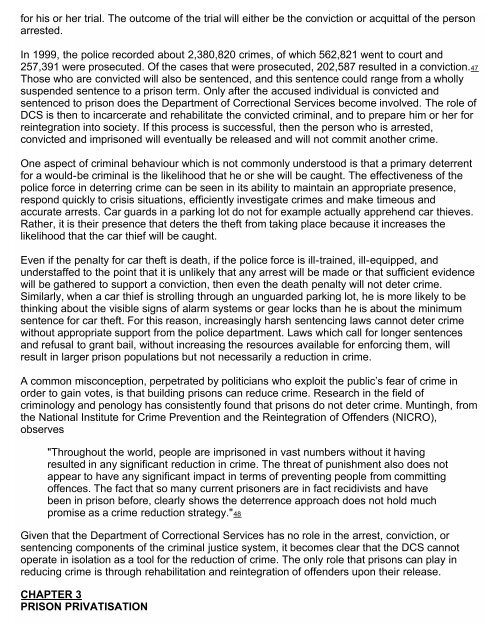prison privatisation in south africa issues, challenges and ...
prison privatisation in south africa issues, challenges and ...
prison privatisation in south africa issues, challenges and ...
Create successful ePaper yourself
Turn your PDF publications into a flip-book with our unique Google optimized e-Paper software.
for his or her trial. The outcome of the trial will either be the conviction or acquittal of the person<br />
arrested.<br />
In 1999, the police recorded about 2,380,820 crimes, of which 562,821 went to court <strong>and</strong><br />
257,391 were prosecuted. Of the cases that were prosecuted, 202,587 resulted <strong>in</strong> a conviction.47<br />
Those who are convicted will also be sentenced, <strong>and</strong> this sentence could range from a wholly<br />
suspended sentence to a <strong>prison</strong> term. Only after the accused <strong>in</strong>dividual is convicted <strong>and</strong><br />
sentenced to <strong>prison</strong> does the Department of Correctional Services become <strong>in</strong>volved. The role of<br />
DCS is then to <strong>in</strong>carcerate <strong>and</strong> rehabilitate the convicted crim<strong>in</strong>al, <strong>and</strong> to prepare him or her for<br />
re<strong>in</strong>tegration <strong>in</strong>to society. If this process is successful, then the person who is arrested,<br />
convicted <strong>and</strong> im<strong>prison</strong>ed will eventually be released <strong>and</strong> will not commit another crime.<br />
One aspect of crim<strong>in</strong>al behaviour which is not commonly understood is that a primary deterrent<br />
for a would-be crim<strong>in</strong>al is the likelihood that he or she will be caught. The effectiveness of the<br />
police force <strong>in</strong> deterr<strong>in</strong>g crime can be seen <strong>in</strong> its ability to ma<strong>in</strong>ta<strong>in</strong> an appropriate presence,<br />
respond quickly to crisis situations, efficiently <strong>in</strong>vestigate crimes <strong>and</strong> make timeous <strong>and</strong><br />
accurate arrests. Car guards <strong>in</strong> a park<strong>in</strong>g lot do not for example actually apprehend car thieves.<br />
Rather, it is their presence that deters the theft from tak<strong>in</strong>g place because it <strong>in</strong>creases the<br />
likelihood that the car thief will be caught.<br />
Even if the penalty for car theft is death, if the police force is ill-tra<strong>in</strong>ed, ill-equipped, <strong>and</strong><br />
understaffed to the po<strong>in</strong>t that it is unlikely that any arrest will be made or that sufficient evidence<br />
will be gathered to support a conviction, then even the death penalty will not deter crime.<br />
Similarly, when a car thief is stroll<strong>in</strong>g through an unguarded park<strong>in</strong>g lot, he is more likely to be<br />
th<strong>in</strong>k<strong>in</strong>g about the visible signs of alarm systems or gear locks than he is about the m<strong>in</strong>imum<br />
sentence for car theft. For this reason, <strong>in</strong>creas<strong>in</strong>gly harsh sentenc<strong>in</strong>g laws cannot deter crime<br />
without appropriate support from the police department. Laws which call for longer sentences<br />
<strong>and</strong> refusal to grant bail, without <strong>in</strong>creas<strong>in</strong>g the resources available for enforc<strong>in</strong>g them, will<br />
result <strong>in</strong> larger <strong>prison</strong> populations but not necessarily a reduction <strong>in</strong> crime.<br />
A common misconception, perpetrated by politicians who exploit the public’s fear of crime <strong>in</strong><br />
order to ga<strong>in</strong> votes, is that build<strong>in</strong>g <strong>prison</strong>s can reduce crime. Research <strong>in</strong> the field of<br />
crim<strong>in</strong>ology <strong>and</strong> penology has consistently found that <strong>prison</strong>s do not deter crime. Munt<strong>in</strong>gh, from<br />
the National Institute for Crime Prevention <strong>and</strong> the Re<strong>in</strong>tegration of Offenders (NICRO),<br />
observes<br />
"Throughout the world, people are im<strong>prison</strong>ed <strong>in</strong> vast numbers without it hav<strong>in</strong>g<br />
resulted <strong>in</strong> any significant reduction <strong>in</strong> crime. The threat of punishment also does not<br />
appear to have any significant impact <strong>in</strong> terms of prevent<strong>in</strong>g people from committ<strong>in</strong>g<br />
offences. The fact that so many current <strong>prison</strong>ers are <strong>in</strong> fact recidivists <strong>and</strong> have<br />
been <strong>in</strong> <strong>prison</strong> before, clearly shows the deterrence approach does not hold much<br />
promise as a crime reduction strategy."48<br />
Given that the Department of Correctional Services has no role <strong>in</strong> the arrest, conviction, or<br />
sentenc<strong>in</strong>g components of the crim<strong>in</strong>al justice system, it becomes clear that the DCS cannot<br />
operate <strong>in</strong> isolation as a tool for the reduction of crime. The only role that <strong>prison</strong>s can play <strong>in</strong><br />
reduc<strong>in</strong>g crime is through rehabilitation <strong>and</strong> re<strong>in</strong>tegration of offenders upon their release.<br />
CHAPTER 3<br />
PRISON PRIVATISATION
















